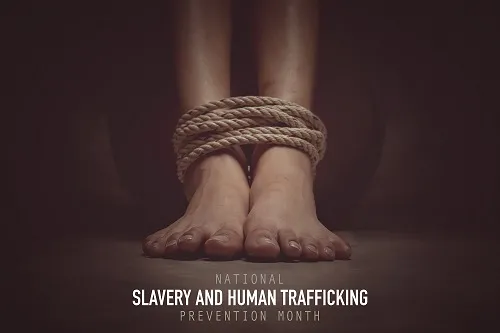Author: R. Gil Kerlikowske

Every day, U.S. Customs and Border Protection (CBP) combats transnational criminal organizations who smuggle narcotics and other contraband as well as those that engage in immigration fraud and counterfeiting. These networks often take years to disrupt and dismantle.
Human trafficking is no different, because it is also an organized, highly profitable criminal enterprise.
As a form of modern-day slavery, human trafficking is a terrible affront to basic human rights. According to the Department of State, 600,000 to 800,000 people are trafficked across international borders each year; 80 percent of these victims are female, and half of them are children. Human trafficking doesn’t just happen in far-away places; it also happens in cities and towns all over the United States.
This issue is so important that a Presidential Proclamation has designated January as National Slavery and Human Trafficking Prevention Month.
CBP is on the front lines of this fight, playing a key role in the Blue Campaign, which is the unified voice for the Department of Homeland Security’s efforts to combat human trafficking. CBP works closely with other DHS components, external law enforcement agencies, government and non-governmental organizations, and the private sector to help educate the public on how to spot signs of human trafficking and report suspected trafficking activity to law enforcement.
The Blue Lightning Initiative (BLI), led by CBP in coordination with the Department of Transportation, is another partnership and awareness initiative of the DHS Blue Campaign. BLI trains airline personnel to identify potential traffickers and human trafficking victims, and to report their suspicions to federal law enforcement. To date, more than 70,000 personnel in the aviation industry have been trained through the Blue Lightning Initiative, and actionable tips continue to be reported to law enforcement.
Airline employees are skilled observers, whether they’re ticket agents or flight crews. CBP supports training airline employees on what to look for and how to immediately report their suspicions to the proper authorities for further investigation. I encourage all airline personnel – as well as rental car company employees – to take this training.
I am proud of the work CBP does every day to combat human trafficking. But we can’t do it alone. It takes everyone – government, private businesses, nonprofit organizations, service providers, and the traveling public – to work together to stop the scourge of human trafficking. I encourage everyone to join us this month – and every month – to put human traffickers out of business by reporting suspicious activity to federal authorities or your local law enforcement agencies.
If you suspect a possible case of human trafficking, anonymous tips can be reported to the U.S. Immigration and Customs Enforcement Homeland Security Investigations toll-free tip line at 1-866-347-2423.

